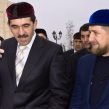
Moscow sees Chechnya’s Kadyrov as a Silver Bullet for the North Caucasus
Publication: North Caucasus Weekly Volume: 20 Issue: 20
By:

“We have agreed, that we will fight against the militants together, regardless of which territory they are in,” Chechen President Ramzan Kadyrov stated on May 17 during a joint press-conference with Ingush President Yunus-Bek Yevkurov. “I have waited long for this day” (Interfax, May 17). Kadyrov was visiting Ingushetia for the first time since Yevkurov replaced his predecessor, Murat Zyazikov, in October 2008.
On May 16, the Chechen, Ingush and federal forces launched joint operation in the border area between Ingushetia and Chechnya—an operation that is ongoing. According to Kadyrov, the leader of the Islamic separatists of the North Caucasus, Dokka Umarov, is among the group of approximately 25 fighters that were trying to escape encirclement by government forces (RIA Novosti, May 17). The insurgents’ primary online resource, Kavkaz-Center, reported heavy fighting in both the Chechen and Ingush mountains, but did not specify the exact origins of the fighters. According to the website, government forces used heavy mortars and helicopters and both sides suffered several casualties (Kavkaz-Center, May 20).
During his meeting with Yevkurov, Kadyrov proclaimed that Chechnya, Ingushetia and Dagestan should join their efforts to quell the resistance put up by Islamic insurgents in their respective regions. Kadyrov’s previous attempts to infringe on Ingush territory in order to carry out attacks evoked increased resistance from both the republican government and the Ingush public. Numerous clashes have been reported between the Ingush and Chechen police forces in the past, but now Yevkurov may well be under pressure from Moscow to accept Kadyrov’s assistance in suppressing the insurgency in Ingushetia. The substantial involvement of Chechen military detachments in the operation in Ingushetia highlights the higher level of Kadyrov’s involvement in the neighboring republic.
Little progress has been made in bringing down violence levels in Ingushetia since Zyazikov’s dismissal last autumn. Violent attacks by insurgents and heavy-handed punitive actions by the government forces have become a daily routine in Ingushetia during the past several years.
Exasperation over the actions of both sides in the conflict—the government forces and the insurgents—has been growing in Ingushetia steadily. On May 9, the parents of an alleged insurgent gang member were killed in the settlement of Ordzhonikidzevskya in Ingushetia. This was the first event of this type in Ingushetia, and it strikingly resembles the tactics of threats and killings of alleged insurgents’ relatives espoused by federal forces and Kadyrov in Chechnya.
While offering his services in Ingushetia, Kadyrov has been facing an increased level of attacks in his own domain, Chechnya, and even in its capital, Grozny. On May 15, two alleged suicide bombers killed four policemen in the vicinity of the Chechen Interior Ministry building in the Chechen capital (North Caucasus Weekly, May 15). Following the attack, Kadyrov’s forces killed four suspected collaborators in the attack on the spot. Kadyrov’s quick-tempered solutions to the problem of insurgency in Chechnya have been criticized by human rights activists as illegal and essentially leading to further radicalization of portions of the population.
According to Kadyrov, no more than 50-70 insurgents remain at large (RIA Novosti, May 16). Yet, the intelligence given by Kadyrov on the remaining number of fighters have been notoriously unreliable, and were habitually downplayed by Moscow and its representatives in Chechnya.
The increased activity of the insurgency in Chechnya comes as an embarrassment to Kadyrov, given that Russian President Dmitry Medvedev solemnly abolished the counter-insurgency operation regime in the republic on April 16. The Memorial human rights group has reported that following the official ending of the counter-insurgency operation regime in Chechnya, young people have been increasingly pressured by Kadyrov’s forces (Kavkazky Uzel, May 20).
In the meantime Yevkurov has imposed peculiar night guard duties on civilian government employees, in what seems to be a naïve attempt to widen the social support base for his policies. The employees have to maintain vigilance alongside with the police, but without arms and corresponding training, essentially becoming human shields for the police forces (Prague Watchdog, May 16). Unarmed civilians observing civil order were fairly common across the country during the Soviet period, but at that time, no clandestine forces outside the government were armed with grenade launchers and other weaponry routinely used by the insurgents in the North Caucasus.
Both trends—the application of harsh, semi-legal tactics to quell the insurgency in Ingushetia and elsewhere in the North Caucasus, and recalling ghosts from the Soviet past, like civilian vigilance patrols—indicate a certain crisis in the thinking of the federal and local governments.
Having virtually eliminated representative democracy on the federal level, Moscow does not accept the fact that this cannot be done so easily also on a local level. As the former president of Ingushetia Ruslan Aushev has repeatedly pointed out, the long term solution for stability in the North Caucasus is restoring popular elections for regional governors. Moscow is still grappling to understand why what works in Moscow and elsewhere in Russia backfires in Ingushetia and other republics of the region. Of course, in the current political environment it is hard to imagine that Moscow will start democratizing the North Caucasus in order to avoid a further escalation of violence.
At stake here is not only the fate of the North Caucasus region, but the future of Russia as a whole. If Moscow opts for a return to elections in Ingushetia, it will be harder for it to ignore calls for the liberalization of Russian political space elsewhere. That will essentially mean putting an end to Putin’s power vertical—an outcome hardly acceptable to the current Russian leadership.




